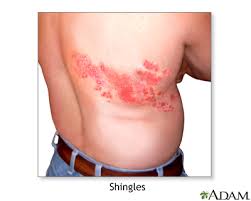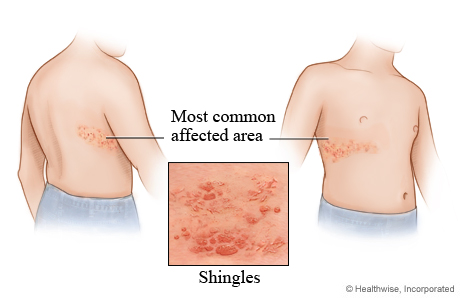Posts Tagged ‘Varicella-zoster virus’
Chicken Pox for Adults? Introducing Zostavax. By Our June Student Pharmacist, Andy Dauner.
Whether from a TV ad or a question from your friendly local pharmacist, you may have heard about the Zostavax vaccine. This vaccine is designed to protect you from the varicella zoster virus, which is the virus that causes shingles.
Shingles appears as a painful, itchy rash often near the waistline, shoulders, or facial area. Shingles usually occurs in people who are 60 years of age or older, but children can have it as well (although it is not very common). Believe it or not, this virus is already inside almost everybody’s body.
The varicella-zoster is the same virus that causes chicken pox in kids. After the chicken pox resolves, the virus lies inactive in the body and can reactivate years (even decades) later for reasons not fully understood. Therefore, anybody who had chicken pox as a child can develop shingles later in life. Shingles is not contagious, however, a person who never had chicken pox can contract it from contact with a shingles rash.
The main concern with shingles is that it is very painful and can cause nerve pain that persists even after the rash resolves. Avoiding these complications is rather easy, as the Zostavax vaccine can help to protect from developing shingles.
The Centers for Disease Control and Prevention (CDC) recommends that anybody over the age of 60 receive the Zostavax vaccine. The FDA has approved it for use in any person 50 years of age or older. The vaccine has been shown to protect people who receive it for five years after immunization. Protection beyond the five year time span is uncertain.
People at highest risk for shingles are those who are over 60 years old, as the body’s immune system tends to decline around this age as people grow older. Also, people who have diseases that suppress the immune system (such as diabetes) or who are on medications that lower the immune system (such as steroids) are also at increased risk.
The vaccine is given subcutaneously, usually in the triceps area. Unlike the flu vaccine (which is given intramuscularly in the shoulder area), Zostavax is associated with less soreness after being given.
Zostavax can be given by a pharmacist without a prescription and is often covered by Medicare Part D and private insurance companies. Remember, the pharmacy can always attempt to run the vaccine through your insurance to let you know of any costs before officially billing you.
If you have any questions about the Zostavax vaccine, your friendly pharmacy staff will be more than happy to answer them for you!
Sources:
Zostavax package insert
Shingles Prevention. By Our August Student Pharmacist, Joshua Kretzer.
Chicken pox affected many of us when we were children resulting in a rash and sores covering the head, arms, and body. The varicella-zoster virus (VZV) is a highly contagious virus that causes the chicken pox infection. VZV typically infects children under 15 years of age. However, VZV can also affect adults.
Once you have been infected with the virus, it remains inactive in your body’s nervous system for life. After infection, it is unlikely you will develop chicken pox a second time. You are, however, at risk of developing shingles.
Shingles can be a very painful condition commonly resulting in a rash on the back that continues around to the stomach. The rash often appears in line patterns on one side of the body.
Other symptoms that potentially occur include:
- Burning
- Shooting pain
- Tingling
- Itching
- Blisters
- Fever/chills
- Headache
- Joint pain
- Swollen glands
The rash is not limited to the body but can occur on the arms, legs, and face, as well. When the face is affected multiple other symptoms can develop including:
- Difficulty moving muscles in the face
- Drooping eye lid
- Hearing loss
- Loss of eye motion
- Taste problems
- Vision problems
The pain associated with shingles can range from mild to severe and can last from weeks to years after the blisters have healed.
Shingles occurs due to re-activation of VZV from the nervous system. It is unknown why the virus becomes re-activated.
Certain people are at a greater risk of developing shingles including:
- People older than 50 years old.
- People who had chickenpox before 1 year of age.
- People who have weakened immune systems.
- People who take medications that weaken the immune system.
Shingles does not only occur in the elderly. Everyone is at risk of developing shingles. You are just at a greater risk of developing shingles as you get older.
Shingles cannot be passed from one person to another. The virus can, however, still be passed to someone who has not been exposed to the virus. Therefore, if you have shingles avoid contact with anyone who has not had chicken pox or the vaccine against chicken pox (young or old–adults can get chicken pox too!).
Unfortunately, there is no cure for shingles. We can, however, prevent shingles through vaccination. Zostavax (also known as the shingles vaccine) is our main line of defense against shingles. By receiving Zostavax, you are able to reduce your risk of developing shingles by up to 50%!
There are still some people who get shingles even after vaccination. Those that do get vaccinated, however, have much milder symptoms than those who don’t receive the vaccine.
Zostavax can be given starting at the age of 50 and is recommended in everyone 60 years and older. Zostavax is a one-time vaccine that can be administered by any pharmacist!
And did I mention that you no longer need a prescription to receive Zostavax? That’s right! No prescription needed! So stop in anytime and see us. We would be glad to discuss any questions or concerns you may have and then get you vaccinated!
Remember, prevention is the best medicine!





